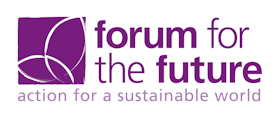How will the circular economy change the way we work?
Governments and business are talking about the urgent need to shift to a Circular Economy, where resources are kept in use for as long as possible by recovering, recycling and reusing products in an economy that designs waste out of its processes.
Achieving this will mean a coming era of new ways of doing business, new solutions and new regulations. A suite of new skills will be required to enable this circular economy, and pioneers have started asking themselves - what new jobs will emerge in this future economy?
Forum for the Future explores different dimensions of the near future with our series of Futures Salons. Together with our friends at the United World College Southeast Asia (UWCSEA) and the Ellen MacArthur Foundation, we help you imagine what it means to operate in a circular economy.
We invite:
- Chris Messer, Sustainability Business Partner, APAC, Kimberly-Clark, to hear from companies that are looking for solutions and services missing in our current economy;
- Sumangali Krishnan, Head of Research & Strategy, Gone Adventurin’, to hear from entrepreneurs who are starting to respond to these gaps, and creating new jobs in the process;
- Students, who will form the crucial engines of this future economy; and finally
- Harri Wavell, Schools and Colleges Programme Manager, Ellen MacArthur Foundation, and
- Nathan Hunt, Director of Sustainability, United World College Southeast Asia (UWCSEA),
to hear from teachers and parents who want to prepare young people for the needs of the future.
Sponsor/exhibitor contact
LiLin Loh
[javascript protected email address]
Publish your content with EB Premium
It's not about how many you reach. It's about who. Get your news, events, jobs and thought leadership seen by those who matter to you.











